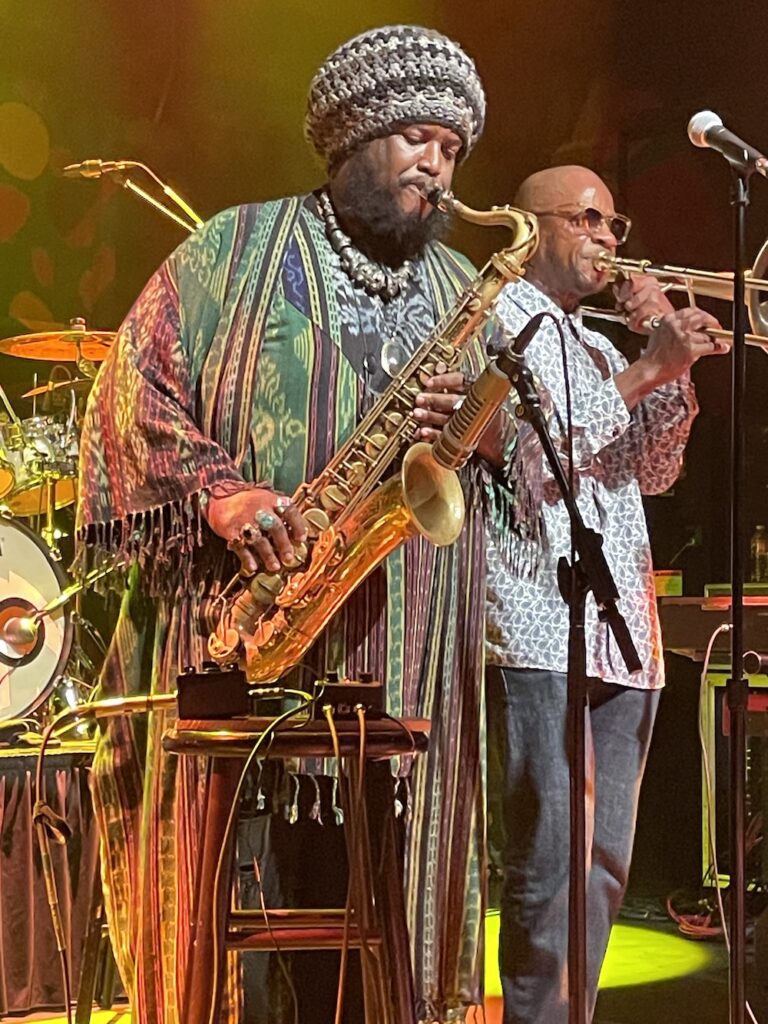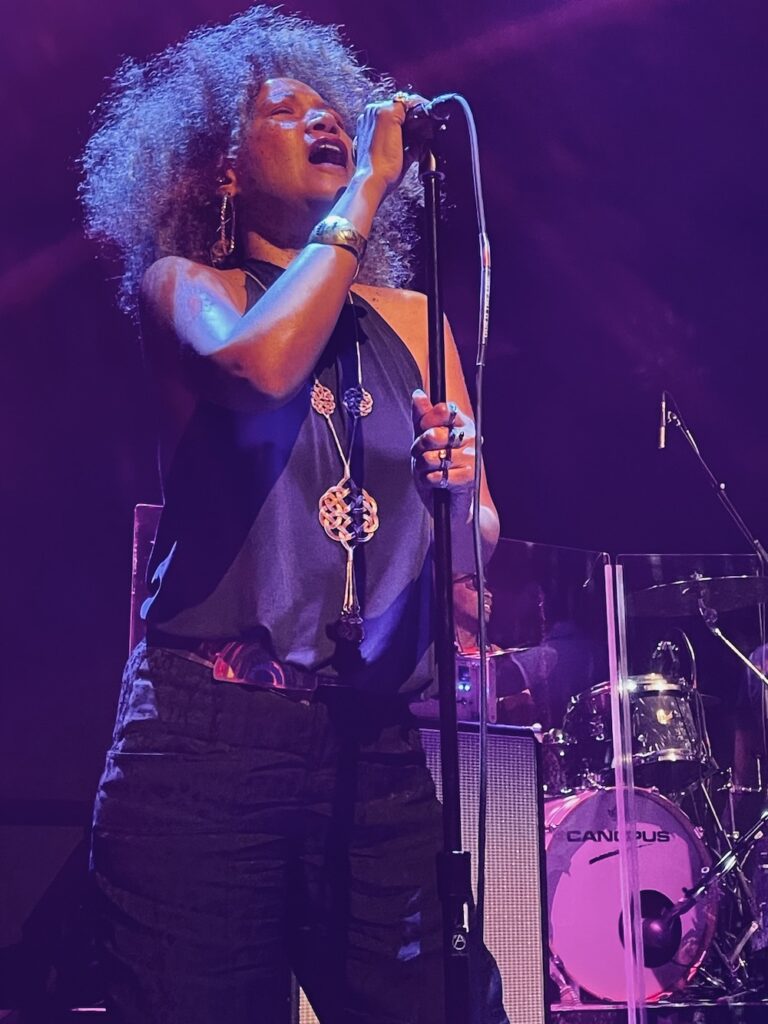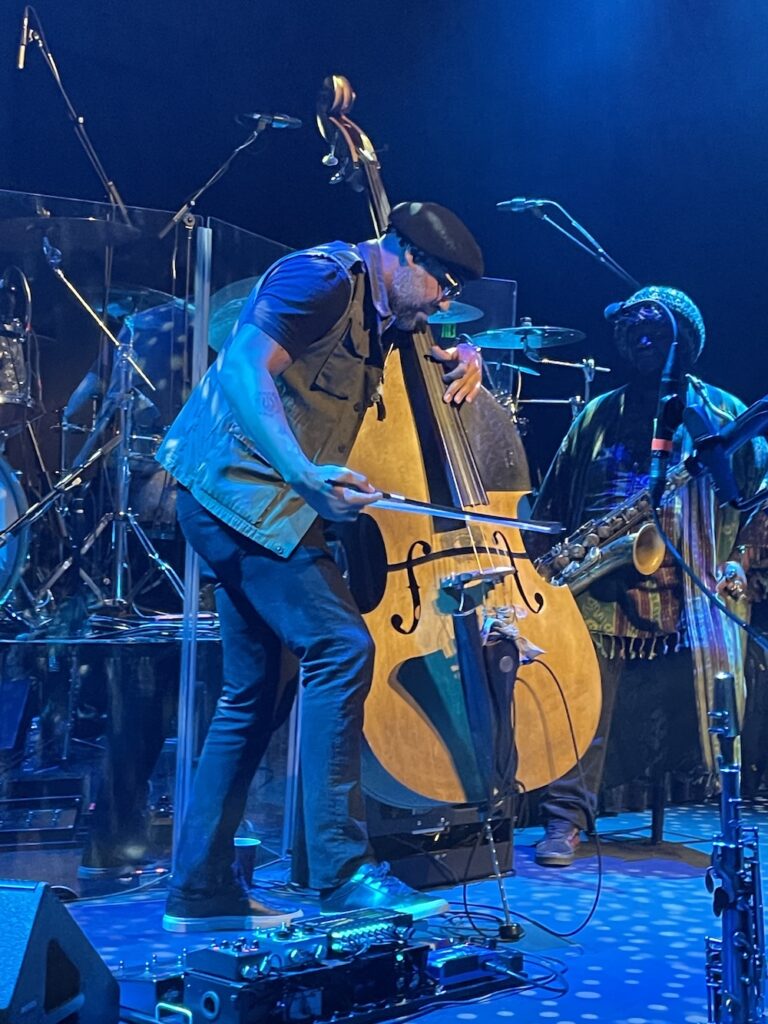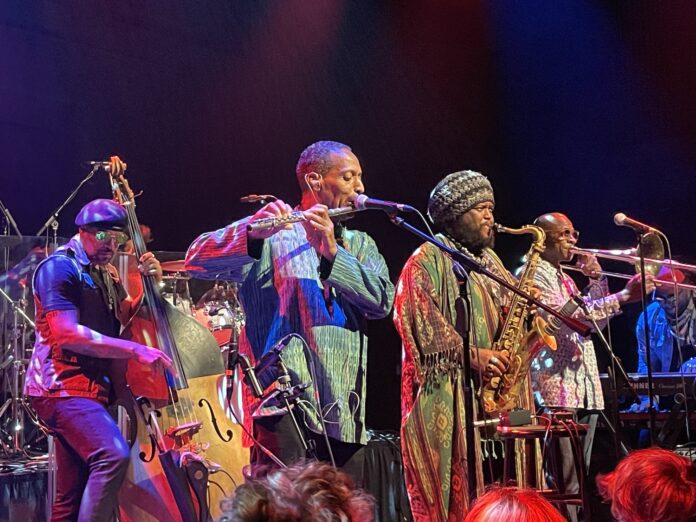Taking Caltrain on a foggy Wednesday night to witness Kamasi Washington perform at The Guild Theatre seemed unthinkable earlier this year. That guy, in Menlo Park?
But in the midst of a summer in which every artist and performer is attempting to re-connect with fans, a paying box office, and a living, everyone is getting back up and on the road.
Better for the fans. I’ve seen three bands in the past five weeks that I thought I’d never see in my life.
That night, July 27, I left from the 4th Street and King station, paying $16.50 for round-trip fare with my Clipper Card, and sitting in a hardly-populated coach. I witnessed the railway environment outside go from urban sprawl to excess big box mall real estate in under an hour.
Kamasi Washington, an ethnomusicology major from UCLA and anime enthusiast, is beyond being just a well-known musician and bandleader. He’s a generational figure, importing modernity to America’s classical music. Updating the jazz canon with ideas from the outlook of Black America in 2022. Pushing the artform, with his tenor sax, further into the now. He’s heavily-studied in the jazz tradition—but also a member of the generation he keeps on inspiring.

Miles Davis began his career playing in jazz clubs and concluded it performing at outdoor rock and funk festivals. Kamasi Washington can walk into a room with Robert Glasper, Terrace Martin, and 9th Wonder, make jokes, and then compositions. Or assemble a soundtrack that reflects Michele Obama’s rise to prominence, and then cover a Metallica song.
His band just played in Napa at the Charles Krug Winery in late July. The set, like the majority of the festival’s shows, leaned heavily into jazz—let’s call it, Black music in general.
Jazz, a temperature reading of where the culture in general is at, was never meant to be static, immoveable, or on a shelf collecting dusty props.
Help us save local journalism!
Every tax-deductible donation helps us grow to cover the issues that mean the most to our community. Become a 48 Hills Hero and support the only daily progressive news source in the Bay Area.
Washington coming in to collaborate with Kendrick Lamar exemplifies this point. We don’t know what the entire impact of To Pimp a Butterfly will be on future Black generations, or anyone who identifies with “the culture.” It’s still developing, someplace in the offing. But it’s Washington’s band—and especially, close buddy and trombone player Ryan “Papa” Porter, that I’d been keeping an eye on for a while.
Porter’s 2018 album The Optimist is a testament to the bond generated by LA’s most acclaimed contemporary jazz group, West Coast Get Down. An immensely-talented collective, it’s story involves a group of school friends who in the 1990’s used jazz-as-a-form-of-escapism that led them to becoming this countries next wave of jazz lions.
In the autumn of 2008, Porter packed 11 fellow Los Angeles jazz musicians, largely from the WCGD, into Kamasi Washington’s parents’ garage, affectionately known as “The Shack.”
To me, this was one of the starting points for the whole jazz revival.

NPR notes that this current renaissance began with Robert Glasper winning a Grammy for his album Black Radio in 2013, “not in a jazz category but for Best R&B Album — it felt like the opening of a new chapter.”
But again, Washington at a Black Music Festival—excuse me—Jazz Festival at the Charles Krug Winery, in the ever-beautiful countryside and achromatic population of Napa Valley, indicates a shift has taken place.
The Optimist predates the UK’s Total Refreshment Centre, another spot which helped incubate the nouveu scene. It foreshadowed Washington’s well-earned accolades, and his score for Michelle Obama’s biography. He and his band composed atmospheric renderings, ‘70s disco, in baroque segments, along with rapt piano orchestration created from scanning the Obamas’ own playlists, which lean in on a certain type of “Motown-ish soul and R&B,” Washington stated in Rolling Stone.
The Shack, even in its name, spoke to those roots from which sprouted the current global jazz swell.
Porter has made it known that he grew up on hip hop, gangsta rap, ’70s soul, funk, and R&B. The Optimist infused these genres of Black America, reminiscent of the way UK jazz renaissance contributors infuse their take on the genre with soundsystem culture, Caribbean accents, EDM, bass music, broken beat—all signifiers of how young Black folks overseas choose to move.
Porter captured the future in that shack.
“It was just The West Coast Get Down in a full state of optimism, recording in late September of 2008, with hopes for something better,” he reflected in the press, years ago, about those salad days.
But Porter and Washington playing together? That’s a whole other thing.
“There’s something magical about the way Ryan and Kamasi play a line together,” Miles Mosley told Bandcamp Daily in 2019. Another Get Down member who also plays on all Porter’s albums, Mosley stressed that “Kamasi leans forward and Ryan leans back in this perfect amount so that the two of them sound like there are four of them. Those two, their minds are so well melded.”
So I get off the train, walk a couple of blocks through the unsullied walkways of downtown Menlo Park, rush into The Guild. The place resembled a smaller version of Bruno’s here in SF, but with a mindful reassembling: it was gleaming, and the staff was sincerely inviting. They should do well this summer and beyond.
Looking up to the stage, there is that line. Filling the venue with reverence. Patrice Quinn on vocals, Rickey Washington (Kamasi’s father) on flute and soprano saxophone, Washington on tenor, and Porter, right next to him, on trombone.
The group fully engaged with the night’s opener “The Garden Path.” Jump-started on keys by the funkster Brandon Coleman, the song featured inspired solos from Washington and bass player Mosley, who plucked, thumped, pulled, slapped, and then eventually, to widespread applause, whipped out his bow and took things into classical improvisatory directions.
A flex acknowledged by all, very early in the evening.
Throughout the seven songs of the 90-minute set, Washington made sure to shout out his band, instead of waiting until the end. It was a family performance on stage, with both Tony Austin and Jonathon Pinson holding down double drum set duties.
But as the band expanded with the cooker “Sun Kissed Child,” (whose melody came into Washington’s head upon looking at his newborn daughter) we got that specific tone from Porter, with those intonations, runs, moods and colors. Jazz, by way of hip-hop and funk, informed by soul, and rooted in colloquialisms we use.
Quinn giving her vocal best namaste reading of the song. All leading to Kamasi Washington, pulling and pushing the rhythm. Skronking. Hovering in the higher register of the tenor sax. Almost pacing, marching in time on stage, eyes closed, ears and spirit open.

Vulnerable, unstoppable.
Just like Charlie Parker and John Coltrane, used to elongate, riff, and write new compositions based on standards or show tunes–things in their cultural zeitgeist—Kamasi unleashed the Kraken’s-worth of his own touch points. One moment, it was a chorus from Parliament Funkadelics “Flashlight.” I pointed my finger up to the sky immediately, just on impulse—he was referencing Bernie Worrells’ one-man-band creation of a classic. Next we get the latter part of John Coltrane’s “A Love Supreme ”updated, recontextualized, aggressive, in an eager sort of way.
Both songs and artists come from two decades’ worth of genius music, ingrained first in African-American and later, global consciousness. Hitting those arrangements of notes, teetering between the funk and the spirit, Washington united the room even further, in a 30-second span.
All the while jazz, engaged by new storytellers, marches on.
As my buddy Todd reminded me last week, after discussing some new traditions I witnessed at a punk show earlier this summer:
“Evolution can be awesome.” His words rang in my ears all the way back to The City on Caltrain.
Yes it can.





